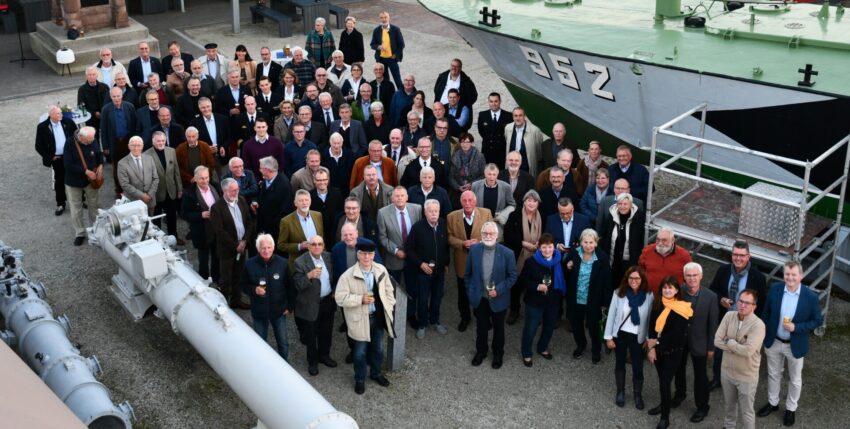It finally worked out. After four general meetings in person that were postponed due to coronavirus, a test circulation procedure and an extraordinary general meeting by circulation procedure, the members of MOV met for an ordinary general meeting in Schortens on 9 October.
This was preceded by a twilight drink on "Rees an Backbord" at the German Naval Museum in Wilhelmshaven on 8 October.
The official part of the meeting centred on the complete re-election of the entire Executive Board, the Council of Elders and the auditors. The new board is younger overall and a good mix of active and retired members, young and old. After many years as Chairman and the relocation of the office from Bonn to Wilhelmshaven, former Vice Admiral Wolfgang Nolting has handed over a very well-ordered house to former Rear Admiral Kähler!
Elected to the Executive Board in accordance with § 26 BGB:
The Chairman of the Board of Directors Rear Admiral (ret.) Thorsten Kähler
The Deputy Chairman Flotilla Admiral Christian Bock
Assessor on the Board of Directors:
1st Assessor Captain (retired) Henning Straus
2nd Assessor Captain (retired) Gunter Schneider
3rd Assessor Captain (retired) Axel Stephenson
4th Assessor Corvette Captain Tanja Merkl
5th Assessor Lieutenant Captain Helge Adrians
6th Assessor Lieutenant-Captain Fabian Dilly
7th Assessor Flotilla Doctor Dr Doris Bücher-Ollig
8th Assessor Frigate Captain Elmar Bornkessel
9th Assessor Frigate Captain Christian Clausing
Auditor:
Former frigate captain Peter Lochbaum
Captain at sea dR Frank Herboth
Council of Elders:
Rear Admiral (ret.) Karsten Schneider
Captain (retired) Hermann Bliss
Fleet doctor Dr Michaela Simon
Former frigate captain Klaus Barth
Former staff captain lieutenant Egbert Schäuble
An initial collage of images will appear in the Yellow Pages of marineforum 11-2021, with a detailed report in our December issue.
Yours
Elmar Brocksieper










One Response
I wanted to wait for the print version of the current marine forum, but now a small contribution:
The election result, which is a reflection of almost all generations of soldiers in active and non-active service in the Navy, is more than welcome for this reason alone. I wish all those elected every success and lots of fun in representing our maritime interests.
The event that stood out most for me during the general meeting, apart from the farewell speech by Vice Admiral Nolting, was the address by the Inspector of the Navy.
Once again, Vice-Admiral Schönbach has put his finger in the wound, a wound that has existed for several years, even decades. It was felt that the wound had begun to fester when, during the Cold War, the likelihood of localised wars began to be suppressed, with the argument that the consequence of a nuclear conflict between the power blocs could be equated with the destruction of the world and that war per se was therefore obsolete. However, this thinking was not accompanied by a revision of military terminology. An example of this is that it was no longer called combat training, but experience-orientated training; destroyers were now only referred to as frigates at most, as a less destructive character was to be conveyed. However, the fact that even the highest military officials questioned whether the deployment of soldiers was dangerous was and still is a cause of unsupportable perceptions. The representations that have led to the Bundeswehr no longer being able to fulfil its politically prescribed mission could continue to be presented. And if at all, then at most as a contribution within the framework of requested subsidiary capabilities, such as tracing chains of infection. The next requests for administrative assistance in this regard are already being formulated.
Among other things, Admiral Schönbach has said, at least as I understand it, that he wants to help enable the navy to fulfil its combat mission again, not only materially and technically, but also psychologically, i.e. not only to be able to fight, but also to want to fight. Just in case diplomacy doesn't know what to do. But personally, I don't believe that he will be able to realise his plan in the next three to four years that he has announced. I would be delighted if he were to plan a longer period of time for himself personally before a successor continues this task, hopefully in his own interests and those of the navy. However, this is subject to the fact that the politicians will also allow him to work.
I would like to make one comment on the upcoming reorganisation of the Bundeswehr. As a long-time member and 'MUT' of the SKB, in particular of the former SKUKdo, I did not understand the first reorganisation in its entirety and certainly not the imminent complete dismantling of a relatively powerful national and international supporter of our forces in basic operations and missions. Among other points, the argument is that the TSKs will regain their organic logistical forces. In my opinion, those who argue in this way forget that the individual TSKs already have these, otherwise this system of the SKB would not work, especially in operations. Keywords such as VR/DOS 3-7 days, or VR/DOS 8-30 days and this in the context of RSOM/I. Anyone who now senses an emerging question mark should do extensive research before decisions of this magnitude are implemented. Otherwise, in my opinion, we will have to deal with incommensurability in the area of national and alliance defence sooner than we currently realise.